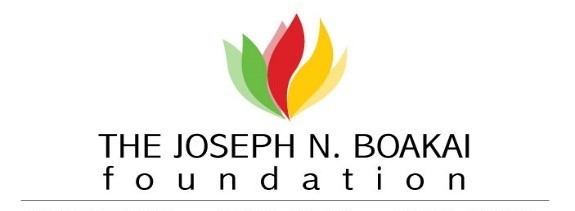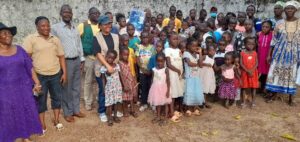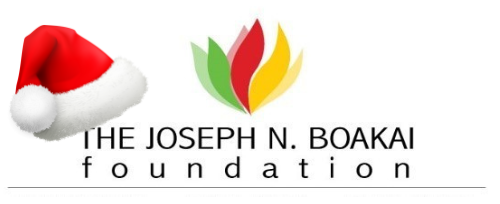ABOUT US

WHAT WE STAND FOR
Envisioned to transform lives and improve the living conditions of all, particularly rural inhabitants, the Joseph Nyuma Boakai Foundation works to support agriculture production and food security, healthcare service delivery, provision of quality education, youth capacity and gender development, provision of safe drinking water, and the promotion and protection of a cleaned environment. The JNB Foundation is a development focused organization working in partnership to unluck the potential of disadvantaged communities and people in Liberia to become sustainably productive and well-off. JNB Foundation’s programs are indirectly managed and implemented by partner organizations called Implementing Partners (IPs).
 We work to give disadvantaged and less privileged youths and women a future. We endeavour to strengthen the entrepreneurial, managerial, and technical competence of people and institutions to develop climate change resilient programs and a capable, and industrious society that is food secured, healthy, literate, just, and inclusive. We are integrity oriented and committed to public accountability and transparency. We value stakeholders’ participation at all levels of our work, including the planning, execution, and the monitoring of programs. We are committed to making annual reports to our stakeholders, backed by independent audited statements. The JNB Foundation is a fully registered and accredited organization, in keeping with the laws of the Republic of Liberia, as well as in Rhode Island with 501C (3) tax exempt status from the United States Department of Treasury.
We work to give disadvantaged and less privileged youths and women a future. We endeavour to strengthen the entrepreneurial, managerial, and technical competence of people and institutions to develop climate change resilient programs and a capable, and industrious society that is food secured, healthy, literate, just, and inclusive. We are integrity oriented and committed to public accountability and transparency. We value stakeholders’ participation at all levels of our work, including the planning, execution, and the monitoring of programs. We are committed to making annual reports to our stakeholders, backed by independent audited statements. The JNB Foundation is a fully registered and accredited organization, in keeping with the laws of the Republic of Liberia, as well as in Rhode Island with 501C (3) tax exempt status from the United States Department of Treasury.
Vision
Our VISION is to become a leading catalyst and driver of transformative social change and improved living conditions of all (mainly rural inhabitants) and a peaceful, inclusive, and equitable society in which people are safe.
Mission
Our MISSION is to aid and support sustainable agriculture production and food security, healthcare service delivery, the provision of quality and affordable education, training of youths and gender development, provision of safe drinking water and the protection of the environment.
Core Values
. Integrity – We act with honesty, accountability, and transparency.
. People First – Communities are at the heart of everything we do.
. Equity & Inclusion – We ensure opportunity for all, leaving no one behind,
. Sustainability – We build climate-smart and future -ready solutions.
. Partnership – We collaborate to achieve greater impact.
. Innovation – We embrace creativity and excellence in our work.
. Service – We lead with compassion and a spirit of humility.
Strategic Pillars
. Empowerment & Livelihoods
. Educational & Skills Development
. Health & Social Wellbeing
. Climate Action & Sustainability
. Governance & Partnerships
Strategic Goals
Our STRATEGIC GOAL is to strengthen and develop the potential of rural and disadvantage communities and people (especially rural women) to become sustainably productive with improved conditions of lives and to feel inclusive and protected.
Vision
Our VISION is to become a leading catalyst and driver of transformative social change and improved living conditions of all (mainly rural inhabitants) and a peaceful, inclusive, and equitable society in which people are safe.
Mission
Our MISSION is to aid and support sustainable agriculture production and food security, healthcare service delivery, the provision of quality and affordable education, training of youths and gender development, provision of safe drinking water and the protection of the environment.
Strategy
Our STRATEGY is rights-based, demand driven, and partnership approach in designing and implementing programs that address specific needs of people and communities for the improvement of the living conditions of all. We work through implementing partner organizations to reach out and partner with less privileged and disadvantaged communities and people to improve their lives.
Strategic Goals
Our STRATEGIC GOAL is to strengthen and develop the potential of rural and disadvantage communities and people (especially rural women) to become sustainably productive with improved conditions of lives and to feel inclusive and protected.
Our History
After decades of public service, the former Vice President of the Republic of Liberia, Joseph Nyuma Boakai, Sr. (2005 – 2017), who himself strived through and felt the biting pinch of extreme hardship when growing up, sensed the deep gapping needs of food insecurity, extreme poverty of rural communities, poor and inadequate healthcare service delivery, appalling poor sanitation, and an alarming low skills development and school dropouts of youths.
 Ever since in public service for more than four decades, he selflessly dedicated his life to alleviating the sufferings of less privileged people, including the empowerment of rural women through ad-hoc employments with the Liberia Produce Marketing Corporation; the empowerment of farmers cooperatives to provide access to markets, farming implements, and credits. At the same time, he facilitated the education and training of hundreds of young people who are professionals in both the public and private sectors today. He also facilitated and supported the construction, rehabilitation, and equipment of health facilities in rural communities, including the Tubugizzue Health Center in Lofa County.
Ever since in public service for more than four decades, he selflessly dedicated his life to alleviating the sufferings of less privileged people, including the empowerment of rural women through ad-hoc employments with the Liberia Produce Marketing Corporation; the empowerment of farmers cooperatives to provide access to markets, farming implements, and credits. At the same time, he facilitated the education and training of hundreds of young people who are professionals in both the public and private sectors today. He also facilitated and supported the construction, rehabilitation, and equipment of health facilities in rural communities, including the Tubugizzue Health Center in Lofa County.
Retiring to private life and with the passion to continue to serve the less fortunate in society and to empower communities, and to leave behind a legacy of selflessness and humility, the former Vice President of Liberia, Joseph Nyuma Boakai, envisioned and established the Joseph Nyuma Boakai Foundation in 2018.
Anchored on six fundamental pillars, the Foundation was formerly launched on November 30, 2018, in keeping with the realization that government has limited capacity to address the needs of all its citizens. These pillars are Agriculture, Education, Health, Youth and Gender Development, Sanitation, and Environment.
With the outbreak of COVID-19 in 2019, immediately following the launch of the foundation, the foundation became resource challenged. Two fundraising events were cancelled, including the book launch in Nigeria and the cassava farm rally with the Cassava Farmers Union.
Notwithstanding, critical interventions by the foundation were made with the acquisition and donation of two ferries to the people of River Cess for use across the Cesto River and the people of Grand Bassa for use across the St. John and the Benson Rivers in Edina.

